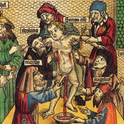Ever since Joe Biden dropped out of the US presidential race in July, pundits have continued to analyse the motives behind his choice and to speculate about its ultimate electoral consequences. Was it indeed the heroic act of self-sacrifice the president’s allies were quick to celebrate? Or more a face-saving move of political expedience? Others argue that the wisdom of Biden’s decision can only be judged come November, since the president has so clearly staked his legacy on thwarting Donald Trump’s attempt to return to power.
Though fascinating, these questions eclipse the greater importance of what Biden did. Whatever his motives, and whatever the electoral fate of Kamala Harris, by choosing to exit a political race he desperately wanted to run in the president gave a timely reminder of what rightful democratic authority amounts to.
For philosophers, sociologists, political scientists and others, political authority refers to the legitimate or socially approved exercise of power by one person or group over others. So, while power may be exercised through coercion or brute force alone, political authority essentially depends on subordinates accepting the right of those who rule over them to do so.
As Max Weber, the founder of modern sociology, taught, political authority comes in different ideal types. In modern democracies, authority is typically “rational-legal”. This means it’s based on a shared framework of norms, values, principles, and laws. Leaders remain symbolically separate from those they represent, with their connection to each other mediated by the rational goals and principles they share.
Charismatic authority is distinct in being grounded in the leader’s perceived exceptional qualities, often attributed to divine or mystical origins. In this model, a deep emotional connection, often based on shared identity, symbolically fuses leader and followers. The autocrats and theocrats who tend to embrace this model often portray themselves as flawless, invincible, or chosen by God, and cast acts against them as attacks on the state itself. What the charismatic leader wants defines what is good, just as what he oppose defines what is bad, not only for himself but for the entire collective he represents.
This is Donald Trump’s stock-in-trade. He presents himself as a leader on a divine mission. In running for the presidency a third time, he seeks to re-enact at national level the same charismatic fusion he has effected between himself and his followers. If you do not support him, you do not support America. If you disagree with him, you hate America. In 2020, he used the full weight of his office to try to overturn the result of the presidential election, and when that failed, whipped up a mob to storm the Capitol and prevent the vote count from being certified. He showed himself willing to cling to power at almost any cost. The implicit premise is that Donald Trump is America, and that the only way to make America great again is to buy into Trump’s exceptional greatness.
As we have come to appreciate in recent years, charismatic authority is often incompatible with normal democratic party politics. A traditional political party is dedicated to principles, values, ideals and goals that are bigger than any one individual. Loyalty is owed to those principles and values for which the party stands. When a party becomes corrupted by a charismatic leader it can quickly collapse into the cult of personality typified by Maga, which—at this point—stands for little more than loyalty to the boss.
In the weeks after Biden’s shockingly poor debate performance on 27 June, Democrats fretted that by continuing his campaign in defiance of the will of his party, the president was beginning to mirror Trump, to enact, however unwittingly, a charismatic style of leadership, as though “he alone could fix it”.
In the rationale he later presented for ending his re-election campaign, Biden made clear that what he wanted and what his party wanted—and the country needed—were different things. Whatever his motives for acknowledging and ultimately bowing to that divergence, he did something vitally important by legitimating it. He made clear that he is but one ordinary, fallible individual whose power to represent the interests of party and country is not mystical or supernatural. Instead, it is vested in him by and removable through the will of the people expressed, ultimately, in votes.
But in the parallel universe created by the charismatic leader there is no conceptual room in which to judge whether the leader’s goals and interests align with those of party and country. Leader and party and country are all magically one. Surely, it is this mystical union— be it autocratic, charismatic or “just plain weird”, as Harris now describes her opponent—that underpins Trump’s assurance to Christians that electing him would make future voting unnecessary.
Democracy is about sharing power fairly, not hoarding it. Joe Biden’s act was not so much heroic as it was democratic, and that stands whatever his motives were, and whatever November may bring. Given the present state of US politics, that alone is cause enough for celebration.













